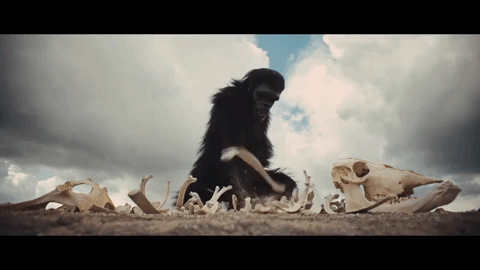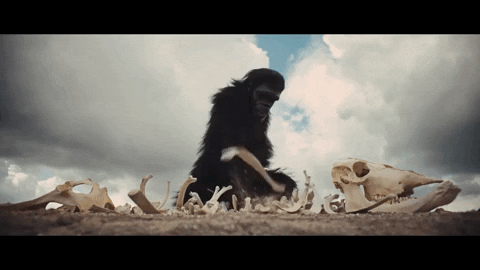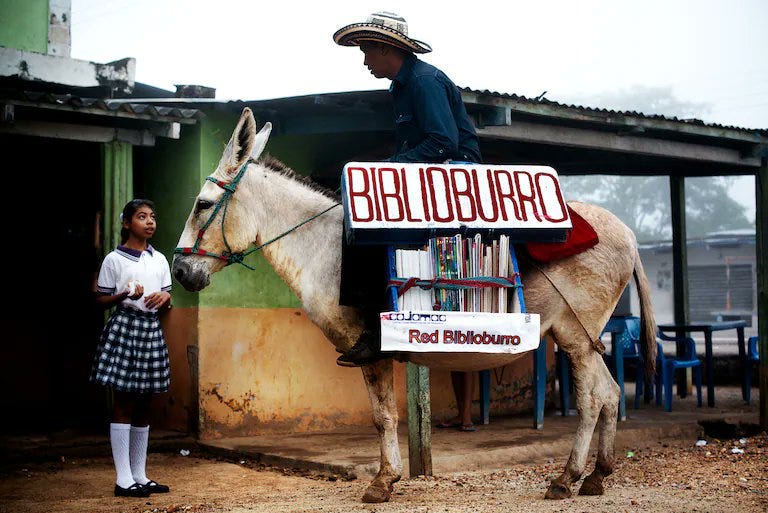🏞️✨The Nexialist #0112
future today: year of focus | ancestral future | designing an economy like an ecologist | everything is a remix pt.4 | monoskop | biblioburro | dashboard | riv
welcome to another week of curated bytes and pixels, the nexialist
hello, folks! i hope this e-mail finds you in the flow (or in need for it). i’m back to cold (and at least sunny) amsterdam, already had a bike ride, voted, and am starting to feel home again. this week you will see some links about futures, ancestrality, economy ft ecology, ai and creativity. read until the end for some more horny wet content 🌊
1 year ago » 🦠✨The Nexialist #0062 : Resilience Tech | Re-perception | Cosplaying as Poor | The Basic Laws of Human Stupidity | Slow Song | Dreamcatching
2 years ago » 🧠✨The Nexialist #0011: Feeling Connected | Collective Effervescence | Egregore | Rethinking Rituals | Digital Commute | Sonic Healing | Vibration Cyborg | Future Today Institute | Book Fight and more...
🔭future today: year of focus
another one of those reports we wait for the whole year, amy web’s future today institute was released this week at SXSW. this year’s theme is focus, since the speed of technologies keep accelerating. i know, it’s a huge and intimidating material (there are 16 reports, one executive summary, and 15 divided in different themes). what i usually do is reading/browing the executive summary, and then searching for keywords important for the projects i’m working on in all the other ones, and i do that all year long. the covers are so beautiful, and i like how they bring insights, questions for your team and how to prepare. just download it!
🏞️ancestral future
i had recommended here before ailton krenak’s ideas to postpone the end of the world (tn#19). on my way back from brazil i read another one of his books, futuro ancestral (without a translation in English). the book is made of 5 essays and even though it is a short book, it is full of knowledge and awe. if you don’t know ailton krenak, i found a link in English with a nice introduction to this book by muniz sodré:
Ailton Krenak is a native philosopher: he carves from Indigenous thought a structure that Westerners are used to recognizing as “philosophy”, and confronts it with European speculative thought and other traditional cosmovisions, in doing so bringing the two together.
for people that work with futures literacy, ailton krenak’s work should be mandatory. i translated the first 2 pages of the book, a kind of introduction for what’s to come in the essays.
In this invocation of ancestral time, I see a group of seven or eight boys paddling a canoe:
The boys rowed in a measured way, everyone touched the paddle on the surface of the water very calmly and harmoniously: they were exercising their childhood in the sense of what their people, the Yudjá, call approaching antiquity. One of them, older, who was verbalizing the experience, said: "our parents say that we are already getting close to how it used to be".
I found it so beautiful that those boys yearned for something their ancestors had taught them, and so beautiful that they valued it in the present moment. These boys that I see in my memory are not chasing a prospective idea of time or something that is somewhere else, but what is going to happen exactly here, in this ancestral place that is their territory, inside the rivers.
one part that i was impressed was about rivers and how the most ancient civilations all gather around them, and how they can tell stories about our past, present and futures. krenak proceeds to tell us about watu:
Watu and other rivers Ailton mentions, alongside their beings, are living entities, intelligent enough to plunge down in search of phreatic surfaces and escape the harsh concrete tiles that attempt to imprison their flow, as well as surviving the ecocide of toxic waste.
read: ancestral future - susanna lea associates
🌱designing an economy like an ecologist

the sentier’s newsletter is always great, but this week it was filled with jewels, so go there if you like great stuff. this piece by kasey klimes, part of the library of economic possibility, is mindblowing, pointing out how a couple oversimplifications have been normalized in the economic economic thinking.
economic thinking has long been dominated by two oversimplifications that have shaped the modern world: the economy can be centrally planned & the economy is a static model.
he makes analogies to explain how we could measure the health of economies: biodiversity x diversity of businesses, nutrient cycling x money velocity and indicator species.
The presence, absence, or abundance of sensitive species are indicators of ecosystem health. Indicator species are the ecological ‘canary in the coal mine’. For example, mayflies are sensitive to water pollution, so their population declines indicate impending problems.
In economics, we might consider the presence of small businesses, young people, or artists in the economy. Their struggle or decline could signal problems with economic opportunity and vitality — just as the absence of mayflies signals pollution.
i think it resonated with me after having just read krenak’s book. i couldn’t help but connect it to cyberpunk vs solarpunk.
The economy is not a machine to be programmed or a windup toy to be set loose, but a garden to be tended. Careful intervention informed by pragmatic learning can tip systems into virtual cycles that outstrip our narrower aspirations of control.
🤖everything is a remix pt.4
i remember watching the first everything is a remix years ago and being so fascinated, and it is even more relevant today that we have AI supporting us with these remixes. his lastest release focuses on generative-ai and takes us into a journey about what creativity is, how generative ai works, ai prophecies in entertainment (and in the real world), creative destruction and crimes against creativity. also, i love the selection of movies he brings in. it is everything is a remix, on steroids.
🖼️monoskop
lana ruff sent me this link some weeks ago and i feel it’s the perfect time to share it. monoskop is a distributed art and studies wiki, filled with references, movements, sources. go there with some time and let yourself learn some new words (and worlds):
Hi ! we are a #wiki / #library / #catalogue for arts and studies, here to spread the word about recent and historical publications and projects in #experimentalart #permacomputing #lowtech #climateaction #decoloniality #technofeminisms #capitalocene #criticaltheory #shadowlibraries #communityservers :www_server: #communityradio :antenna: #everydaytechnology #libreculture #floss :unwanted_tux: #diwo #care #artistpublishing #soundart #experimentalfilm #arthistory #weird etc..
📚biblioburro
talking about ancestral futures: while we have a distributed arts resource online, in rural colombia, knowledge rides on the back of donkeys with these mobile libraries.
Travelling with his two loyal donkeys, Alfa and Beto, Luis Soriano has been spreading the joy of reading to children in rural Colombian communities for over 20 years.
via messy nessy chic
🐎dashboard


Tobias van Schneider:"Today I learned ↓ The word "Dashboard" comes from the board on the front of a horse carriage which prevents mud from kicking up on the passengers as the horses are "dashing" through the dirt.
this appeared on twitter, and as someone who loves a good dashboard, this made me quite confused/surprised. would dashboards help us avoid the muddy mess of data?
🌊rivers
this one is for andrea. miley released her new album last week, endless summer vacation, and it is already a hit. the new song, river, could not be more timely with this week’s theme. it is quite horny poetic, as the river she’s mentioning could be the other persons characterists (strength, infitinity, power and flow) OR other bodily fluids 🫦
see you next week, little rivers🌊
❓If you want to know what a Nexialist is, click here.
🔎If you want to see what I’ve already posted, visit the archive and use the search engine. Even I do that a lot.
💌I want to know what you think/who you are! Your feedback is highly appreciated; you can e-mail me or fill in this short survey. Thank you! 🙏🏻
🔌Let’s Collab?
I truly believe innovation comes from bringing improbable areas together, and that’s why I called this project The Nexialist. Some sectors are known to be self-referencing and hermetic. Sometimes teams are on autopilot mode, focused on the daily grind, which hinders innovation. As a Nexialist, I like to burst these bubbles, bringing references from different areas, and maintaining teams inspired and connected to the Zeitgeist.
I offer inspiration sessions called Brainsparks, creative desk research (Zeitgeist Boost), Plug’n’Play deals for workshops and sprints, and other bespoke formats. If you want to know more about this, send me an e-mail with your challenge(s) and we can figure something out together. Check out my website and some work I’ve done below:








